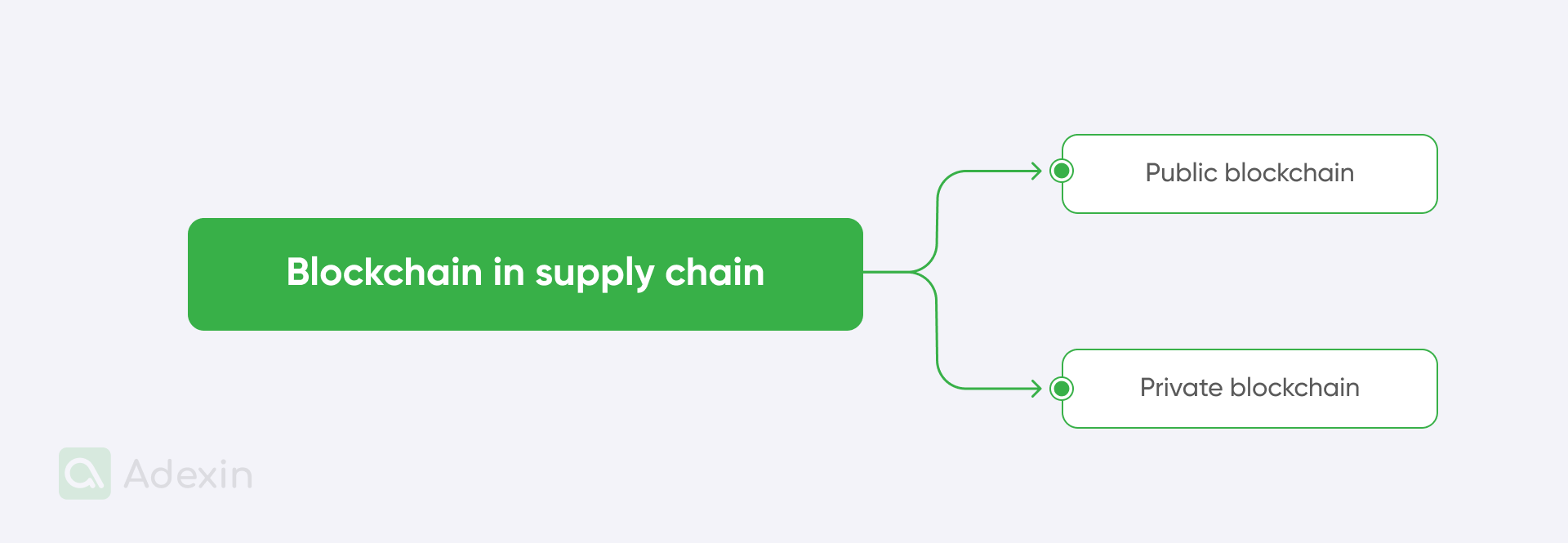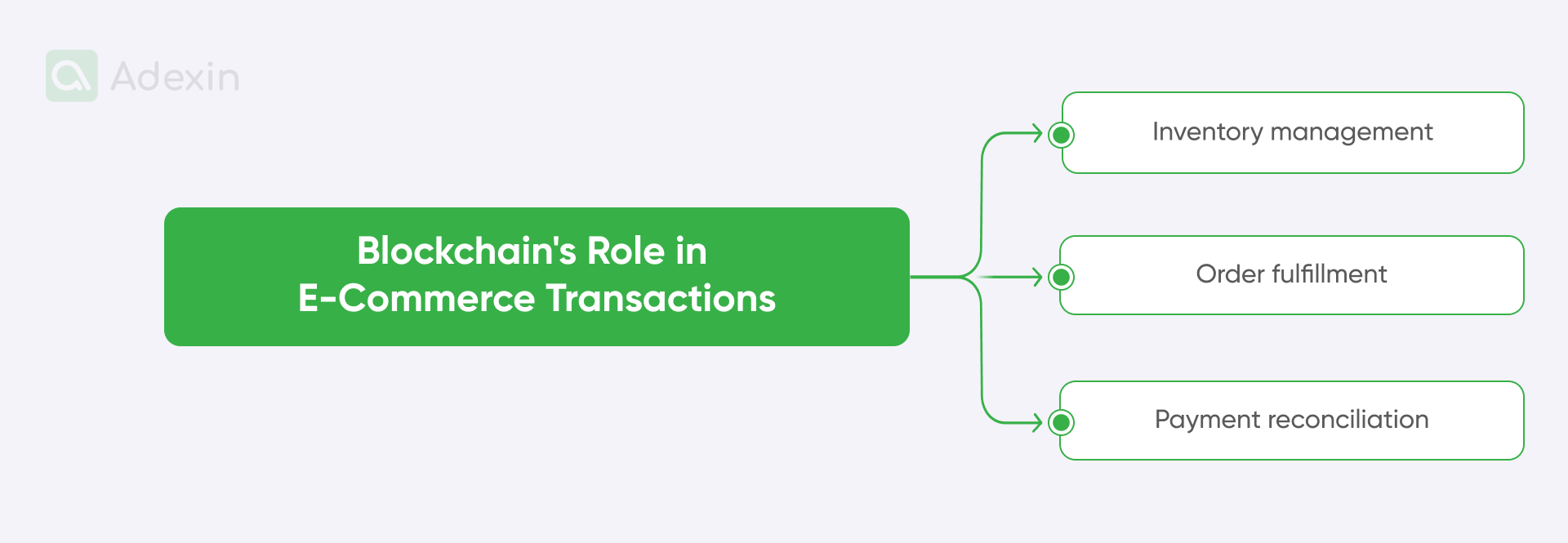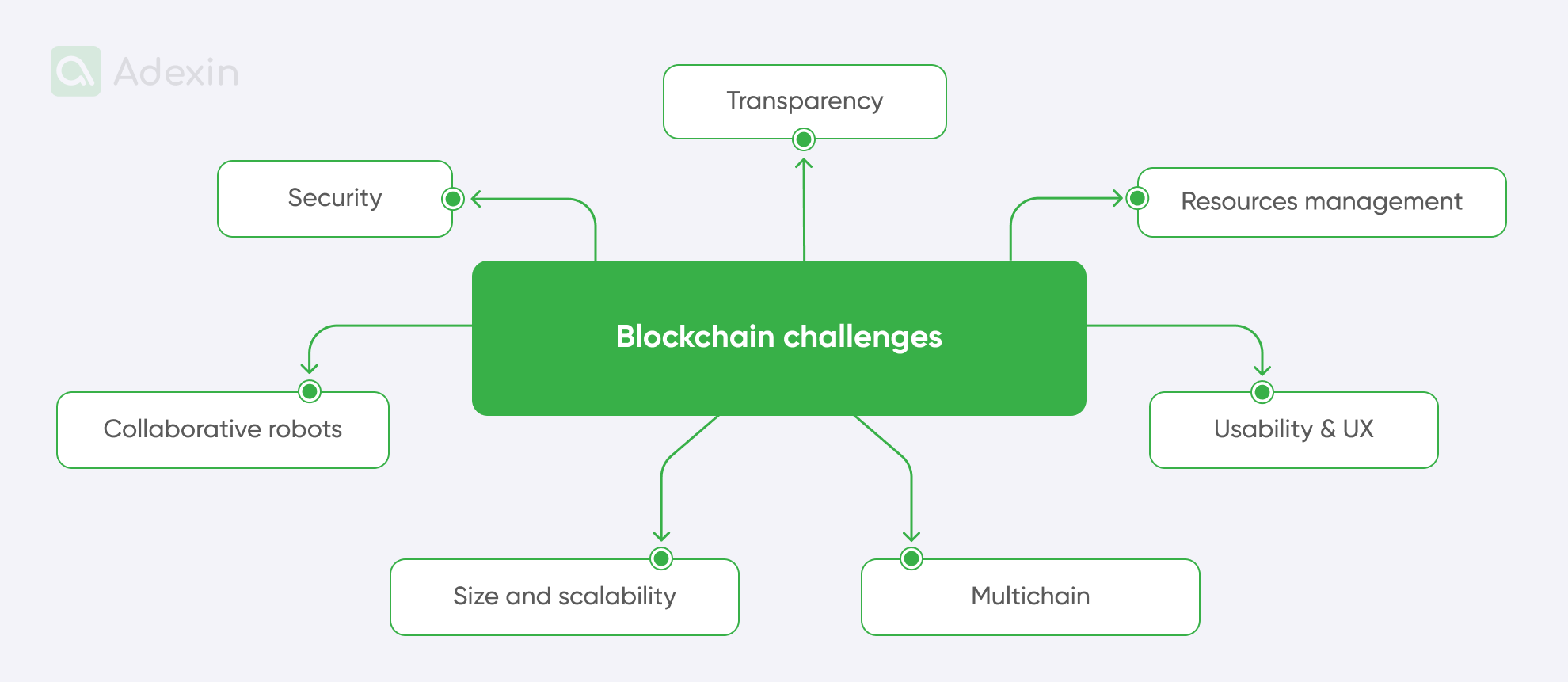Blockchain in supply chain management decentralizes the source of data and preserves a record of ownership of digital assets. Data is supplied across the network in its ledgers, and its assets are secured against modification by third parties that could access its source. This delivers a completely new perspective to the business on handling operations in the supply chain.
Today, we share our insights on the aspects of blockchain in supply chain and logistics. You'll see the overall impact of blockchain in the supply chain through a clear overview that is understandable for newbies in this area. We'll give a glimpse of our business experience, where we added examples of blockchain in the supply chain software development built for our customers in the supply chain.
Get this unique knowledge from people who have implemented a blockchain project in a hands-on manner. We don't serve vague perspectives or speculations. Still, we give you a sense of custom software development and successful deployment in the transportation and logistics, so to speak, supply chain as a whole.
What is blockchain technology?
Blockchain technology is an advanced database mechanism that allows transparent information sharing within a business network. A blockchain database stores data in blocks that are linked together in a chain.
The origins of blockchain technology date back to 2008, when Satoshi Nakamoto created Bitcoin. Introducing a decentralized system, Nakamoto conceptualized blockchain to monitor Bitcoin transactions. Confusion initially reigned, with many associating blockchain exclusively with Bitcoin. However, around 2014, it became clear that blockchain had potential beyond its role in digital currency transactions.

Blockchain in supply chain meaning
Traditional supply chains don't use blockchain technology. This is a huge disadvantage in supply chain management. What separates it is its nature, which is that it is a public database available to anyone who uses it, with each user having a full or partial copy. New entries require permission from other database owners. In addition, the blockchain network allows the implementation of cryptocurrencies and smart contracts.
Blockchain is a decentralized system that is not controlled by any single entity, so the place for blockchain in the perspective of the supply chain has its particular dedicated area where it serves as a shared infrastructure among all participants.

What distinguishes blockchain technology are its two main types:
Public blockchain supply chain management
Anyone can participate in a public blockchain. Bitcoin, for example, operates on a public blockchain. It also allows one interested in taking part in the business to join the network. Supply chain transactions on a public blockchain are transparent to all participants because the ledger is open for public inspection.
Private blockchain supply chains
On the other hand, private blockchains are centrally managed and require permission for access. They are typically used within a single organization or between supply chain partner organizations. The permission-based nature of private blockchains ensures that only authorized entities can participate, increasing security and privacy.
Blockchain in supply chain and logistics
Blockchain eliminates the need for a central governing body in inter-organizational blockchain-based workflows, streamlining processes and enabling automation. This professional term can be explained in much simpler words by giving an example from the supply chain, where your employees in the Logistics Control Tower send shipping digital documents to carriers.
What happened next is that these documents are securely stored and shared across the blockchain network, accessed by various carriers per request. Each process step, from document creation to delivery confirmation, is recorded as a block in the chain. Because this system doesn't rely on a central governing body, there's no need for manual oversight at every stage. So, there is no need to forward the documents or confirm the data's correctness. Instead, automation takes over, ensuring smooth operations and faster decision-making.
What is super important in this context of the communication between freight forwarders, distributors, and carriers is that, pretty soon, blockchain could replace Electronic Data Interchange (EDI) standards. No one could think that EDI would be replaced so soon because its simplicity is so essential. But it looks like it will happen. Especially along the way with companies that want to secure their shipments, this will refer, in the first instance, to high-value shipments.
Does EDI complete blockchain technology?
And one more thing. EDI doesn't compete with Blockchain technology, as IBM stated. Blockchain technology is pushing away EDI from a supply chain perspective as electric trucks are pushing diesel engines out of the streets. At the point made by IBM, we can only agree that EDI will still be perceived in the supply chain for many years as digital transformation is moving slowly in a wider perspective.
You see this often, even at fairs like one recently held in Stuttgart, LogiMAT, where the German producer of intralogistics vehicles, Jungheinrich, exhibits autonomous cars and electric pallet trucks (EPTs). But believe it or not, after nearly ten years working directly in logistics and supply chain, I can say that some companies still need another decade before they will implement one autonomous vehicle, not to mention blockchain technology.
So to speak, taking a step apart from giants like DHL, FedEx, UPS Supply Chain Solutions, and others, billions of small and medium-sized companies simply have a short budget, few customers, and a low perspective on return on investment (ROI) from any technology adaptation.
On the other hand, small and medium-sized businesses can adapt much faster when they start using external software services, mostly in blockchain technology, where custom software development is primarily important given the complexity of the supply chain. So, it can be cost-efficient, too.
However, before adopting blockchain technology in the supply chain, it is important to be aware of the challenges. Some of them involve ambiguous responsibilities, and some are related to different user perspectives.
Blockchain in supply chain finance
When we think about supply chain, blockchain, and finances, we cannot find a better segment than e-commerce. Blockchain secured transactions in supply chain operations, taking steps toward a secure financial system in e-commerce and other areas. Blockchain in the supply chain revolutionizes payments and financial transactions by eliminating intermediaries for direct peer-to-peer transactions and automating payment reconciliation with intelligent contracts.
Blockchain's role in eCommerce transactions
Blockchain in e-commerce transactions is particularly valuable from the perspective of managing supply chains more effectively. It enables tracking and tracing of products from origin to end consumer. So, all that is about terms such as blockchain in supply chain traceability.

Here's how you can simplify processes using blockchain technology:
Inventory management for global supply chain
Order fulfillment in the supply chain industry
Payment reconciliation for all supply chain networks
As indicated, the involvement of blockchain in e-commerce operations, particularly in the financial direction of the supply chain, is noteworthy. Based on our experience, we can assert that from 2024 onward, this element should be seriously considered. For instance, blockchain will be particularly impressive for transportation platforms handling payments in B2B scenarios. Imagine a truck driver delivering several carts to a multi-brand store from an e-commerce warehouse in supply chain networks. He unloads the carts, but there's a requirement that payment for two carts should be made upon delivery.
What to do then? You already have the appropriate application where he can handle the invoice payment process, ensuring immediate payment upon delivery. However, you can further secure the transaction with blockchain to safeguard your business. It ensures that the entire transaction process remains intact, with the same application interface but increased backend security to prevent data breaches.
It's similar to adding an extra security lock to the door. Consider how much more helpful this becomes when you consider that not just one truck but about 500 drivers across the country use the same custom-developed mobile payment platform.
Need help with custom mobile app development?
Learn how we can boost your logistic business processes
Explore moreBlockchain in supply chain example from Adexin
It's time to share our internal experience, where we were involved in a project to implement Blockchain technology in the supply chain. We had a case with a business that operates in the transportation and logistics industry. Thanks to this, we can present our insights and explain how product revamp implementation of blockchain technology. Here, we can deliver on how to build a secure and fast system for document generation and exchange.
As pointed out, our case was for a shipping document management platform using blockchain technology. It was closely related to the handling of shipping documents. The case we worked with eTEU team, is a digital platform that streamlines document generation, editing, and transmission through an easy-to-use management system.
Here are the challenges involved that we worked with before taking steps on this project:
The high volume of data handled through supply chains
Tight timeline for data transferring based on transactions in global supply chains
High vulnerability to human error, leading to penalties and reputational damage
The complexity of document formats and standards across different departments
Ensuring data privacy and security compliance with regulatory requirements
Integration challenges with existing legacy systems and third-party platforms/users
Difficulty in maintaining data integrity and authenticity throughout the document lifecycle
As mentioned, the main objectives of the project were to ensure secure data transfer and offer a solution to track edits and changes to prevent unauthorized changes in the documents, etc.
"During this process, we decided to be more proactive and dive deeper into the perspective of logistics and transportation customers. It was really about finding out what the experiences of the users, the transportation and logistics people, the Control Towers staff that operate in the global supply chain, and the transportation managers and coordinators who can really benefit from this platform are. This was very helpful because by looking at the actual work of end users, we could really sort out the problems that can occur in the case and help prevent them upfront!"
George Maksimenko, CEO at Adexin
With eTEU, all transfers are meticulously recorded on the blockchain network, establishing an immutable audit trail. This shared ledger ensures that every transaction between parties can be thoroughly verified. Moreover, blockchain technology speeds up the process of exchanging documents, taking advantage of the high value of transactions.
The enhanced eTEU platform streamlines workflow management for logistics and supply chain companies, making it easier for them to transform digitally with efficiency and compliance. With eTEU's incremental approach, can start small, avoiding resource drains and long timeframes while achieving quick releases.
Advantages of blockchain technology developed with the participation of Adexin:
Streamlined workflow management for logistics and supply chain company
Facilitate digital transformation with efficiency and compliance.
An incremental approach that starts with small steps, avoiding resource drains and long timeframes.
Indeed, accelerated development, especially of backend processes, is achieved through strategic supply chain partners and software development.
Faster iterations and launches through collaboration with external partners.
Achieved 6-month implementation, which demonstrated the effectiveness of outsourcing to streamline operations and resource allocation.
Our role in accelerating the development of eTEU was particularly in backend processes. This exemplifies the benefits of strategic partnerships with technology companies. eTEU's collaboration with external partners resulted in a very successful ending. We provided them with long-term benefits with blockchain technology that works today.
7 key challenges to implementing blockchain in the supply chain

1. Transparency and supply chain management
Blockchain provides a transparent and immutable ledger that records all transactions and activities within the supply chain. In supply chain traceability, blockchain refers to each participant in the network who can access and verify the information stored on the blockchain. This ensures transparency and visibility into the flow of goods from the point of origin to the final destination. However, this also poses some risks.
2. Throughput and latency in the supply chain
Blockchain throughput refers to the number of transactions it can process per unit of time, and latency refers to the time it takes to confirm a transaction. Blockchain has limited throughput in supply chain applications where real-time transaction tracking and processing are critical. For this reason, latency can be a challenge.
3. Size and scalability in supply chains
As more data is added to the blockchain, its size increases, leading to scalability issues in blockchain applications dedicated to the supply chain, especially in large-scale operations involving multiple transactions and data points. Therefore, managing the growing size of the blockchain can become complex and resource-intensive. Keeping data sanity is also very challenging at that point.
4. Security
It's a thing, but something that is supposed to be more secure still poses some security issues and data breach problems. While blockchain technology offers inherent security features such as immutability and cryptographic validation, it is not immune to security threats. Supply chains are susceptible to various cyber threats, including hacking, data breaches, and fraudulent activities that can compromise the integrity and security of blockchain-based systems.
5. Resources management
Adding new blocks to a blockchain, known as mining, requires significant computing resources and energy consumption, especially in the proof-of-work (PoW) consensus mechanism. In supply chain applications, where sustainability and resource efficiency are increasingly important, the environmental impact of blockchain mining can be a concern.
6. Usability & UX for apps in supply chains
User experience and interface design play a vital role in the adoption and usability of blockchain technology. Complex interfaces, lack of user-friendly tools, and interoperability issues with existing systems can hinder the adoption of supply chain management. This clearly set some standards for human interaction with the software. The reason is that stakeholders may have varying technical expertise, so it is better to hide all that we can give everyone user-friendliness through a mobile device, etc. It can also be gained by custom software development, where your software business partner can feel your needs.
7. Multichain
Blockchain networks may undergo protocol updates or split into separate chains, so-called hard forks. It is leading to compatibility issues and potential disruptions to supply chain operations. Moreover, the proliferation of multiple blockchain platforms and protocols (multi-chains) can create interoperability challenges. So, it is difficult to establish standard processes and mechanisms for exchanging data across the supply chain ecosystem. It refers to what we said about the EDI standard, which will not be replaced within the next few years.
Are you in search of a reliable tech partner?
Adexin can help with advanced logistics solutions
Contact usFinal takeaway on blockchain supply chain solutions
Starting from the origins and evolution of blockchain in the complex global supply chain and its role in revolutionizing financial transactions, especially in e-commerce from a supply chain perspective, it can be said that this approach has completely modernized traditional supply chains and maintained supply chain transparency. However, we also explained how it helps with document management, which requires specific security and access authorization. Real-life examples such as the implementation of blockchain in eTEU highlight the tangible benefits and challenges of integrating blockchain into supply chain digital transformation processes.
By taking advantage of blockchain's decentralized nature, supply chain operations gain greater transparency, security, and efficiency. Through strategic partnerships and innovative solutions, blockchain can redefine the future of supply chain management.
We offer a way to streamline operations and increase trust throughout the supply chain. If you're ready to unleash the potential of blockchain in your supply chain and become one of the supply chain disruptions, look at our comprehensive guide. Take the first step toward transforming your operations today. Contact us to learn more.

